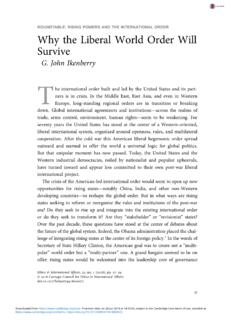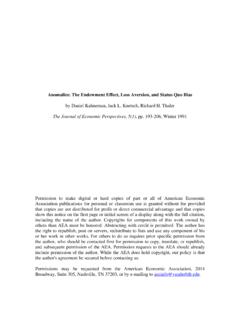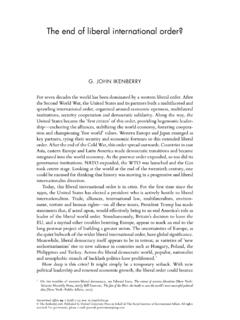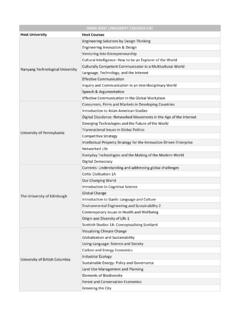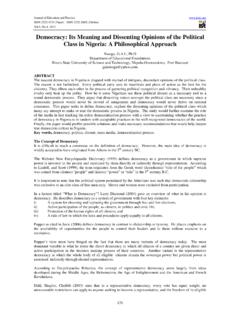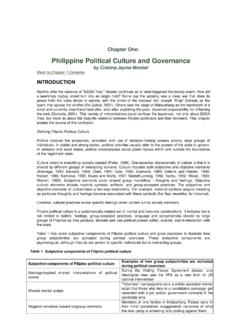Transcription of Globalization and its Political Consequences: The E ects ...
1 Globalization and its Political Consequences: The Effects on Party politics in the WestHelen V. Milner, Princeton University Current Draft: September 20, 2018 AbstractGlobalization has grown much since 1980s. What Political trends have been associated withthis growth? This paper examines two aspects of the Political consequences of Globalization , according to some economic theories, has adverse consequences for la-bor, especially less skilled labor, in the rich democracies. If these voters are the median, thenwe might expect parties to respond to this by turning against Globalization and the openness toflows of goods, services, people and capital that it brings. Have parties turned against economicopenness? And have parties, especially extreme right-wing ones, that oppose openness advancedin terms of their electoral strength as a result?
2 Furthermore, have these pressures from global-ization been mitigated by social welfare policies, as earlier research claimed? First, updating andextending the research of Burgoon (2009), I ask whether Political parties in the advanced indus-trial countries have adopted more anti-internationalist platforms as Globalization has , I examine whether parties have been affected deferentially by Globalization ; in particular,have extreme, right-wing populist parties gained vote share as Globalization has proceeded, whilemainstream left ones have lost. The evidence suggests that Globalization , especially trade, isassociated with a Political turn to anti-internationalism and to extremist Count: 13647 words (Excluding Abstract, Appendix, and References) Prepared for the annual APSA conference, August 2018 Boston MA.
3 Thanks to Dominic De Sapio, SayumiMiyano, and Bryan Schonfeld for their excellent research assistance. Many thanks to Noam Gidron, Nita Rudra,Bryan Schonfeld, for their helpful comments on various versions. Comments from the conference on Globalization ,Polarization and the Eroding Foundations of International Order at Stanford University in June 2017, from thecolloquium at the Institut des Sciences Politiques in Paris in October 2017, and from the Nuffield College ComparativePolitics seminar in Oxford in February 2018 have been very IntroductionGlobalization has grown much since 1980s. What trends in politics have been associated with thisgrowth? This paper examines two aspects of the Political consequences of Globalization , involvingthe party systems in established democracies.
4 Over the years concerns about the compatibility ofdemocracy and capitalism have continuously been raised. But with a global capitalist market now inplace these concerns have been magnified. In a globalized world will democracies be able to respondto their publics so that their citizens remain supportive of democracy itself? Or, will globalizationaffect publics and party systems in such ways that majorities of the public and their Political partiesturn against not just incumbent governments and Globalization but against democratic governanceitself?Economic Globalization , according to some economic theories, is likely to have adverse conse-quences for labor, especially less skilled labor, in the rich democracies. If these voters are themedian, then we might expect Political parties to respond to this by turning against globalizationand the openness to flows of goods, services, people and capital that it brings.
5 Have parties turnedagainst economic openness? And have parties that oppose openness advanced in terms of their elec-toral strength as a result? Earlier research showed that certain conditions could mitigate the effectsof Globalization . This research looked at the role of left parties and labor organizations and the sizeof the welfare state. Strong left parties and labor organization as well as a large welfare state wereshown to dampen Political reactions against Globalization (Garrett 1995, 1998, Garrett and Mitchell2001).1Do these factors still exert such influences?I examine two issues here. First, updating and extending the research of Burgoon (2009), I askwhether Political parties in the advanced industrial countries have adopted more anti-internationalistand more nationalist and populist platforms as Globalization has advanced.
6 He showed that global-ization as associated with more anti-internationalism but that social welfare spending could mitigatethis , I ask whether certain types of parties, especially extremist ones, have gained vote shareas Globalization has proceeded. I also examine whether centrist left parties, whose base of supportis the industrial working class, have lost vote share as Globalization has advanced. Globalizationcould have direct or indirect effects on politics . I explore both here, focusing on how it may operateindirectly through deindustrialization. First, I show that deindustrialization is directly driven in part1In Milner (2018), I explore Garrett s claims about left-labor strength and the welfare state with a very Globalization . Then I try to unpack the direct and indirect relationship between globalizationand party vote shares using mediation analysis.
7 In future work I hope to look directly at voters preferences and see if rising Globalization is associated with changes in their evidence here is cross-national. Recent research by economists and increasingly by politicalscientists has become more micro in orientation. In part this is because of a frustration with poorcross-national data and in part with concerns over causal inference in large-N cross-national are both valid points. Given the highly regional implications of Globalization , aggregate cross-national studies may be very imprecise. But they still do present a picture of the broad correlationsand trends common to many countries. And replicating important prior research seems worthwhilein order to understand how these broad patterns may have changed over evidence here suggests that Globalization is having direct effects on party platforms and thatsocial welfare may not mitigate these effects as much any more.
8 Trade and FDI are both generatingpressure for parties to adopt more anti- Globalization platforms. And the extent of social welfarespending in a country is not mitigating this much any more. Second, Globalization is indirectlyexerting an impact on party vote shares. It is increasing support for extreme right-wing populistones and decreasing support for center left ones. This indirect effect is coming through its impact ondeindustrialization, which has affected all the major established democracies lately. Globalizationin these ways seems to be having a major impact on politics within developed democracies and tobe generating a reaction against causal pathway(s) by which Globalization may work to affect politics need greater hope to investigate more in future work whether these effects come through Globalization via risinginequality (see Bourguignon 2015), through the effect of Globalization on reduced job opportunitiesand stagnant wages, through international financial liberalization and integration that facilitatedcrises, or through Globalization s acceleration of technological change.
9 Initial analyses here, however,suggest that deindustrialization, or the relative decline of jobs in manufacturing, seems to be stronglyassociated with rising extreme right-wing party votes. In future iterations I hope to examine theseother forces in greater depth, especially to see if they are related to Globalization as deindustrializationappears to Main Questions and TheorySince the 1970s, Globalization the cross-border movements of capital, goods, and people hasexpanded significantly. There have been immense welfare gains from this growth, especially from2trade, in both the developing and developed world. These gains have not been evenly distributed,either within or across countries. Some economic theories the Stolper-Samuelson theorem, inparticular predict adverse distributional consequences for labor, especially less skilled labor, inrich Gordon (2017, p.)
10 633) points out, Globalization is working as in the classiceconomic theory of factor price equalization, raising wages in developing countries and slowing theirgrowth in the advanced nations. If these voters are the median in these countries, do politicalparties respond by turning against Globalization and openness to cross-national flows of goods,services, people, and capital? If the means for compensating them no longer work, then do thesevoters turn against openness and to populism?3 The questions addressed here are four. One, does Globalization lead parties to adopt more anti-internationalist and populist positions? Two, does Globalization lead directly to more votes forextremist parties, especially on the right? Three, does Globalization indirectly affect politics throughother means?






